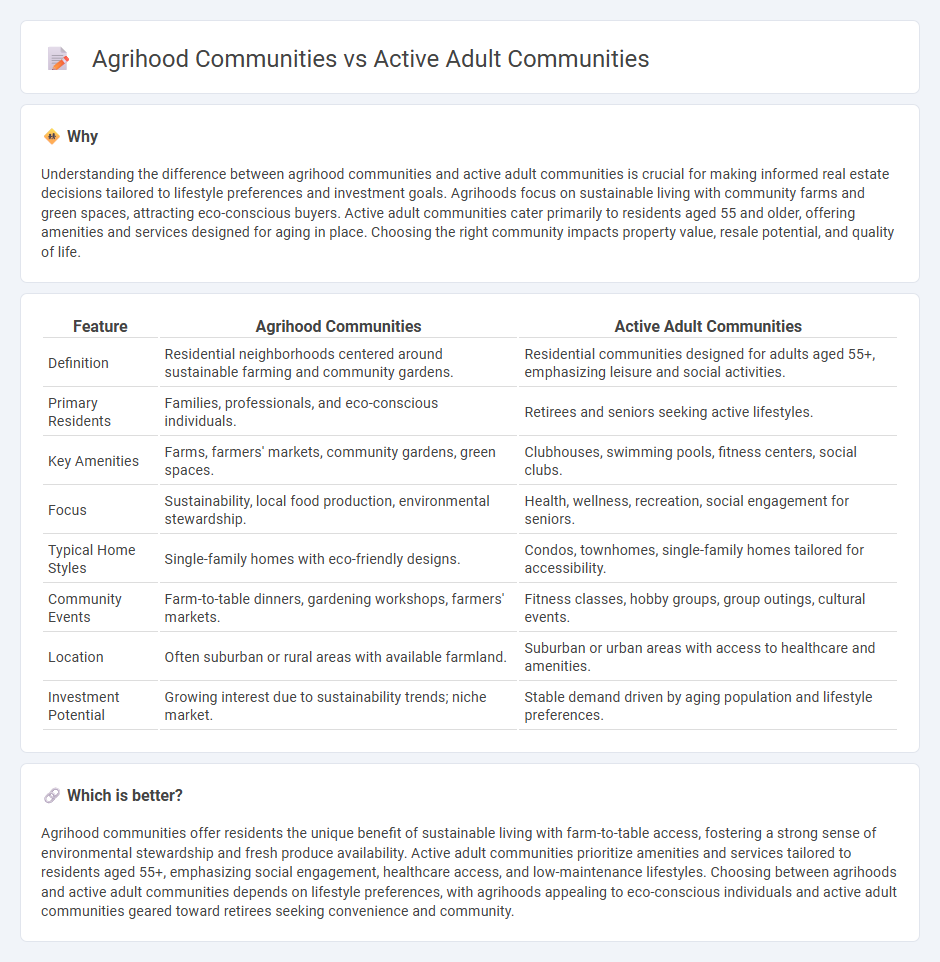
Agrihood communities integrate sustainable farming and residential living, offering fresh produce and green spaces that promote eco-friendly lifestyles. Active adult communities cater specifically to residents aged 55 and over, featuring amenities that support social engagement, wellness, and low-maintenance living. Explore the unique benefits and lifestyle options of both community types to find your ideal real estate investment.
Why it is important
Understanding the difference between agrihood communities and active adult communities is crucial for making informed real estate decisions tailored to lifestyle preferences and investment goals. Agrihoods focus on sustainable living with community farms and green spaces, attracting eco-conscious buyers. Active adult communities cater primarily to residents aged 55 and older, offering amenities and services designed for aging in place. Choosing the right community impacts property value, resale potential, and quality of life.
Comparison Table
| Feature | Agrihood Communities | Active Adult Communities |
|---|---|---|
| Definition | Residential neighborhoods centered around sustainable farming and community gardens. | Residential communities designed for adults aged 55+, emphasizing leisure and social activities. |
| Primary Residents | Families, professionals, and eco-conscious individuals. | Retirees and seniors seeking active lifestyles. |
| Key Amenities | Farms, farmers' markets, community gardens, green spaces. | Clubhouses, swimming pools, fitness centers, social clubs. |
| Focus | Sustainability, local food production, environmental stewardship. | Health, wellness, recreation, social engagement for seniors. |
| Typical Home Styles | Single-family homes with eco-friendly designs. | Condos, townhomes, single-family homes tailored for accessibility. |
| Community Events | Farm-to-table dinners, gardening workshops, farmers' markets. | Fitness classes, hobby groups, group outings, cultural events. |
| Location | Often suburban or rural areas with available farmland. | Suburban or urban areas with access to healthcare and amenities. |
| Investment Potential | Growing interest due to sustainability trends; niche market. | Stable demand driven by aging population and lifestyle preferences. |
Which is better?
Agrihood communities offer residents the unique benefit of sustainable living with farm-to-table access, fostering a strong sense of environmental stewardship and fresh produce availability. Active adult communities prioritize amenities and services tailored to residents aged 55+, emphasizing social engagement, healthcare access, and low-maintenance lifestyles. Choosing between agrihoods and active adult communities depends on lifestyle preferences, with agrihoods appealing to eco-conscious individuals and active adult communities geared toward retirees seeking convenience and community.
Connection
Agrihood communities and active adult communities both emphasize a lifestyle centered on wellness, sustainability, and social engagement, attracting residents seeking a healthier, more connected living environment. These developments often integrate community farms, gardens, and recreational amenities designed to promote physical activity and foster neighborly interaction, appealing especially to active adults focused on longevity and holistic living. The shared focus on community-driven experiences and healthy living creates a natural overlap, making agrihoods increasingly popular choices for active adult real estate markets.
Key Terms
Age-restriction vs. Multigenerational
Active adult communities enforce strict age restrictions, typically welcoming residents aged 55 and older, promoting a lifestyle tailored to retirees and seniors. Agrihood communities embrace a multigenerational approach, integrating farmland and sustainable living with residents of all ages to foster a connected and diverse neighborhood. Discover more about how these distinct community models cater to different lifestyle preferences and demographics.
Lifestyle amenities vs. Farm-to-table focus
Active adult communities emphasize lifestyle amenities such as fitness centers, golf courses, social clubs, and organized activities designed for residents aged 55 and older seeking an engaging, maintenance-free living experience. Agrihood communities prioritize a farm-to-table lifestyle, integrating sustainable agriculture, organic gardens, and local food experiences to foster a connection with nature and promote healthy living. Explore the unique benefits and offerings of each community type to find the ideal match for your lifestyle preferences.
Retirement living vs. Sustainable agriculture
Active adult communities prioritize retirement living by offering age-restricted neighborhoods with amenities like fitness centers, social clubs, and healthcare access tailored to adults aged 55 and older. In contrast, agrihood communities focus on sustainable agriculture, integrating residential living with organic farms, community gardens, and environmentally friendly practices to promote food security and ecological balance. Explore the unique benefits of each lifestyle to find the perfect retirement or eco-conscious living option.
Source and External Links
The Pros & Cons of 55+ Active Adult Communities - Explores the benefits and drawbacks of active adult communities, which are designed for a retirement-friendly, low-maintenance lifestyle with various amenities.
55+ Active Adult Communities in California - Offers a range of active adult communities in California by Del Webb, providing a social lifestyle with amenities like pools and fitness centers.
California 55+ Retirement Communities & Homes for Sale - Provides information on the best 55+ communities in California, including homes for sale and expert advice on active adult living.
 dowidth.com
dowidth.com